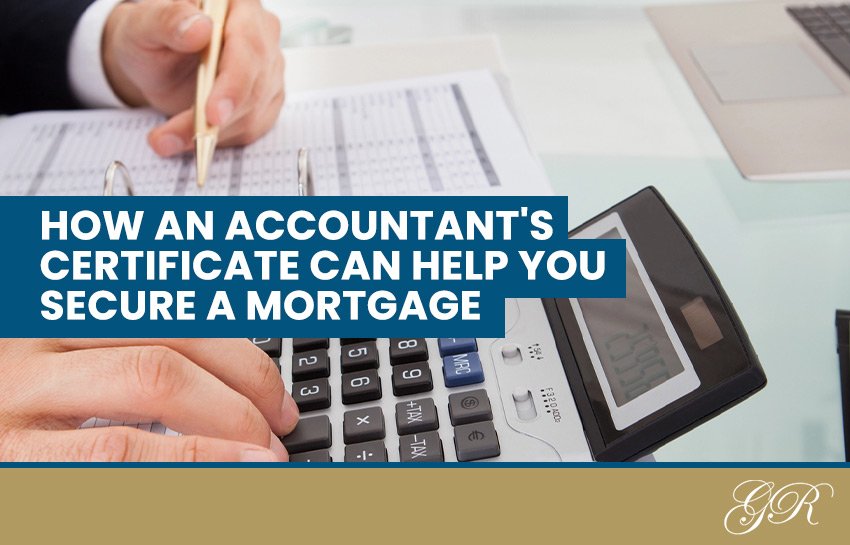If you are a self-employed sole trader or limited company director, it’s likely you’ll come up against a few challenges when it comes to applying for a mortgage. It’s down to the fact that your income is harder to prove than it is for those in regular employment. Mortgage lenders are likely to ask for an accountant certificate confirming your taxable income.
An accountant’s certificate verifies self-employed income and financial stability. Lenders use this to assess affordability, increasing your chances of getting a mortgage. The certificate must be produced by a chartered accountant or certified accountant with recognised qualifications.
In this blog, I’ll explain accountant’s certificates, what they are, why they are needed, who can produce one, and how to get one. I’ll also touch on what other financial details you may need to provide when it comes to mortgage borrowing.
Goldmanread is a dedicated mortgage broker for professionals. Get in touch with us today.
What is an accountant’s certificate?
An accountant’s certificate confirms a self-employed person’s income and financial commitments when applying for a mortgage.
This certificate must be issued by a qualified accountant who is a member of a professional body like the Institute of Chartered Accountants or the Institute of Financial Accountants.
Along with accountants’ certificates, mortgage lenders use financial documents like bank statements, company accounts, and tax returns to confirm the borrowers’ good financial standing.
For specialist loans, they may also request information on the company director’s background and history.
How do you get one?
Only qualified accountants can issue a mortgage certificate, so check your accountant’s credentials to ensure they meet the lender’s criteria.
If necessary, you can easily find another qualified professional with recognised credentials. Your mortgage lender will usually provide a list of qualifications that meet their criteria.
Most lenders will be satisfied with qualifications from organisations like the Institute of Financial Accountants, Chartered Certified Accountants Association, or Association of Accounting Technicians.
Why do lenders need an accountant’s certificate for a mortgage loan?
Mortgage lenders need reassurance that you can pay the mortgage back, which is why they carry about an affordability and credit assessment. For employed people, it’s more straightforward, as they have proof of employment history via payslips and P60s.
Income is naturally more difficult to prove for self-employed people. In the past, there were ‘self-certified’ mortgages, meaning that a self-employed person could provide their own certificate as proof of income. Nowadays, lenders ask for proof of income from an independent entity, such as an accountant.
The certificates help ensure the applicant’s income figures are accurate, reducing the risk of loan defaults and providing assurance to lenders. This has become particularly important to lenders as self-employment has continued to grow apace in recent years.
What information is included in an accountant’s certificate?
An accountant’s certificate will include:
- Accountant’s details: Name, firm, qualifications, contact info.
- Client’s details: Name, business name, address, business type.
- Income: A breakdown of the client’s income over the last 2-3 years, including profits (before and after tax), dividends, and any other income streams.
- Business stability: A statement about the financial stability and viability of the business and any future projections.
- Declaration: A statement from the accountant declaring the certificate’s validity.
What financial information do mortgage lenders ask to see for self-employed mortgages?
Along with an accountant certificate, lenders may ask for the following:
- Tax returns (SA302 forms) – to check payments are up to date.
- Business bank statements – to see cash flow and business stability.
- Personal bank statements – to see personal financial management and affordability.
- Proof of ID and address – to confirm your legal residency.
- Business accounts (e.g. balance sheet, profit and loss statement and cash flow statement, usually for the last 2-3 years) – to see the financial health and performance of the business.
How will the certificate help with my mortgage application?
For most mortgage lenders, an accountant certificate is compulsory for self-employed mortgages. They need reassurance that the regular mortgage payments are affordable to mitigate the risk of payment defaults.
Without one, you may find that your application is unsuccessful or that you are offered less favourable terms, e.g., a higher interest rate.
What are the benefits of getting an accountant’s certificate?
Having an accountant’s certificate can make all the difference in whether your mortgage application is approved.
It gives the lender reassurance, meaning that you may even be offered a better mortgage deal with lower monthly mortgage repayments.
What type of accountant can certify accounts for mortgages?
Only authorised public accountants who hold recognised institute accountancy body qualifications can provide a certificate for a mortgage.
The type of professional bodies and accountant qualifications recognised by most mortgage lenders are:
- Chartered Certified Accountants (CCA)
- The Institute of Management Accountants
- The Institute of Accounting Technicians
- The Institute of Chartered Accountants
- The Association of Accounting Technicians
- The Association of Taxation Technicians
Lenders who consider expatriate applicants may accept certificates from international accountants, provided they belong to a chartered institute.
Need more advice? Get in touch with Goldmanread today
Certified accountant certificates are just one example of how a mortgage application is more challenging for a self-employed person. At Goldmanread, we understand this can feel overwhelming, but as an experienced mortgage broker, we can help.
We have been successfully overseeing mortgage applications for clients since 2009. We will guide you through the paperwork and improve your chances of mortgage approval by finding lenders who understand the needs of self-employed applicants. What’s more, we’ll handle the entire mortgage application process to save you time and hassle.
Allow us to assist you in securing a self-employed mortgage more efficiently and with less stress. Contact us to get started.
We hope that you have found this article useful and informative. For further reading on mortgages for professionals and self-employed individuals, see our blog.

